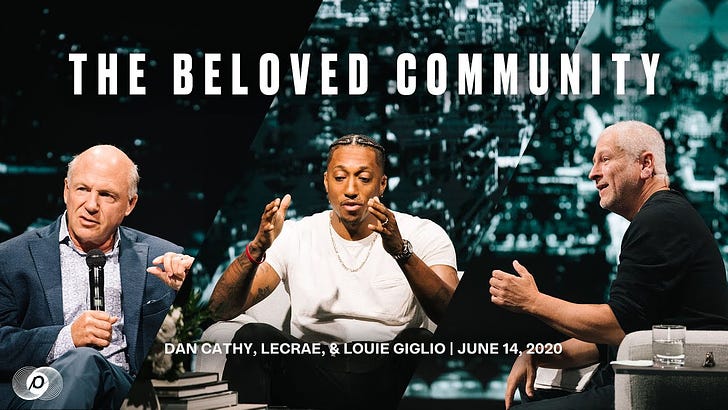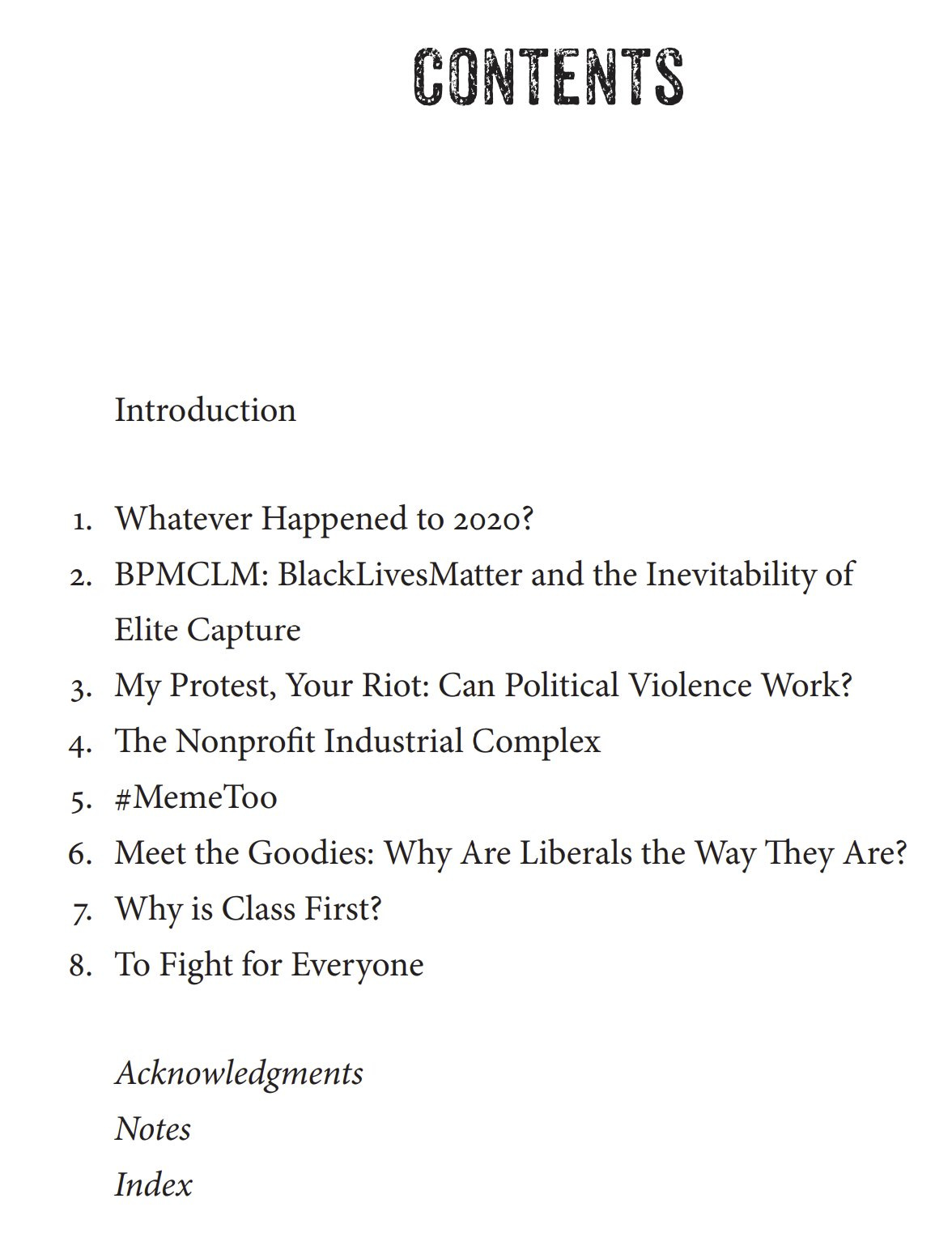Politics, Not Apology, or What My New Book is Actually About
it's got nothing to do with "wokeness," really
The above video generated some conservative consternation when it was published in June of 2020. Those were the immediate post-George Floyd killing days, and the country was perhaps a little on edge. In the video the CEO of Chick-fil-A, Dan Cathy, shines the shoes of a Black musician, then says that he has sent out thousands of shoe shine brushes in the past to inspire people to serve others. As you can imagine, the clip was somewhat misrepresented in conservative social media, which suggested that Cathy had told white people specifically to shine the shoes of Black people specifically. This was not quite true. But as the Snopes piece says, while the broader sentiment was more general, it was also clear that Cathy was speaking and acting in the spirit of racial politics, particularly in a conciliatory way - in a way that suggests that personal reconciliation is the point of racial justice. He says in the video that we need to approach race with “a contrite heart, a sense of humility, a sense of shame, a sense of embarrassment begat with an apologetic heart.”
The video is, to put it mildly, a rich text. I would like to set that aside for a moment and consider the fixation on contrition, in that context. This was a particularly weird example involving the CEO of a company with a (shall we say) peculiar public profile, but it wasn’t unusual in the sense that it primarily advocated feeling - a contrite heart, a sense of humility, a sense of shame and of embarrassment, an apologetic heart. Cathy’s perspective was an exceptionally pure expression of an ideological position that’s inescapable in the 21st century, the assumption that political problems are solved with affective impulses, that the careful application of the right emotions can tear down any walls. This attitude embodies so many of the elementary pathologies of our approach to social problems: the marginalization of material inequality, the fixation on self-flagellation, the delusion that emotions can be controlled or would lead reliably to actual change. Because of its ugly (and frankly bizarre) resistance to gay marriage, Chick-fil-A is a conservative-coded company. And yet Cathy’s unthinking attitude towards what constitutes identity progress reflects assumptions that are profoundly cross-ideological. Assumptions, as you know, that I find profoundly wrongheaded and self-defeating. As Olúfẹ́mi O. Táíwò says, “the way you change the world is by changing the world.”
Of course, that video is the lowest-hanging of fruit. Corporate social justice has been so relentlessly critiqued already that there’s little reason to do so again. No one is looking to Chick-fil-A for lessons in how to pursue racial justice. I do however want to use that old clip to perhaps clear up a misconception about my upcoming book, How Elites Ate the Social Justice Movement. (Preorder now!) I’ve seen a lot of people who assume that book is about “wokeness”/identity politics/political correctness/etc. On the one hand, it’s fair enough; I have the reputation I have, fundamentally, because of my own choices and fixations. But I think what my book is actually about, and what it’s not about, is a distinction that’s very important to left politics writ large. Fundamentally, “wokeness” is a question of manners, of the interpersonal relations between people and the way that academic social liberalism has come to dictate appropriate behavior, at least in the eyes of American institutions. It’s a question of the personal politics associated with social justice. Campus speech codes are what we call “woke,” and so is the urge to shove more characters of color into children’s cartoons, and so is the endless mushrooming of new terms for old concepts, as each of these is about individuals acting in a particular way to make sure other individuals feel a particular way. The Platonic woke controversy entails someone doing or, more often, saying something that’s seen as offensive and being in some sense disciplined, whether personally or professionally, by HR or by a Twitter mob. And the actual dispute revolves around whether the action or utterance was in fact offensive and whether the punishment was proportional and fair.
My book isn’t about any of that. Instead, it’s about the social justice movement, the efforts by activists to utilize political power to grow their coalitions and achieve certain kinds of policy ends. The George Floyd protest movement and its associated offshoots, which takes up the bulk of the book’s attention, are filled with people who would be called woke, but the story of that movement is fundamentally not the same story as how (say) Young Adult fiction went insane. The BlackLivesMatter moment of 2020 was an attempt to achieve actual material change for Black people, with a focus on reducing police violence. In the attempt, the movement garnered a level of attention for street protests and associated legislative work that’s probably unprecedented in American political history, at least in terms of scope of media attention and intensity of feeling. The fundamental observation that the book makes is that all of this immense outpouring of good intentions and support, both momentous and ephemeral, came to very little, and the question it asks is why. That’s fundamentally a topic concerned with organizing and activism, with partisan politics, with municipal systems, and with messaging. Correspondingly, the book mentions (for example) campus political controversies only in passing, but focuses intently on Occupy Wall Street, the role of nonprofit organizations in progressive politics, and the labor movement, among other things. These are all adjacent to identity politics, but in a very explicit sense, the book is not about identity politics, not at all.
The book is also, for the record, deeply sympathetic to the intentions and goals of the movement it ultimately harshly criticizes. I fully expect this attitude to be misrepresented (or at least ignored) in reviews, as both progressive and conservative reviewers will likely have incentive to see the book as a brutal takedown. But I didn’t write that book; to be honest, that book sound boring and redundant to me. What doesn’t strike me as boring and redundant is to say this: “Let’s stop and think for a moment - this movement that seemed so powerful three years ago has clearly failed, but life moves so fast that it feels like we haven’t really processed that fact, and anyway a lot of people have reasons not to ask hard questions about this. But if we want to do better in the future, we have to have a free, honest, and critical accounting of where things went wrong. Why did so much noise result in so little change? And what can we do better moving forward, to craft the kind of equitable society we say we want?” I think that’s a conversation worth having, and I think it’s something very different from just complaining about the latest evolution in language politics.
That so many people seem confused about this elementary distinction - between what we call “woke” and the social justice movement - is telling, and not in a good way. As I’ve long complained, “the personal is political” has become such a hegemonic and universalizing impulse that many younger people simply don’t understand the concept of a politics that’s not personal. Gen Z, in particular, often seems incapable of conceiving of politics as something other than the careful arrangement of personal behavior and branding. In their defense, they’ve never lived in a world with a real, disciplined, adult American left movement. Their culture has taught them that to do good and to be good are coterminous. And one of the points that I’m making, in my book, is that if there’s a more equitable future ahead of us, we all need to unlearn the lesson that the Chick-fil-A CEO was trying to teach us, that the work of justice is the work of feeling, of language, and of symbol. We have to return to a world of things, to a language of self-interest, and a politics of shared prosperity. If we want to win, we have no choice.





It is hard to organize to eliminate a problem, when your descriptions of the problem are based on lies. (E.g. "Hands up, don't shoot").
The real number of unarmed blacks killed by white police officers anually is now somewhere around 6 per year, and was below 20 preceding George Floyd. The only good number is zero - but unarmed doesn't actually mean not attacking an officer, and dead officers is not a good outcome, either.
Polls showed that 40% of Democrats believe that number to be over 1000 per year.
If you lie - or even deceive - on a massive scale to the public about what are the biggest problems, you end up trying to solve the wrong problems, in the wrong way - and likely make things worse.
Freddie, I'm a big fan and have been since the primordial internet days of reading your comments on old blogs. But one issue I've always had with these arguments from you is that while I agree with most of your individual points, I feel like there's one key problem keeping it all from holding together, and that is that most of what we see and hear - from protestors, from corporate spokespeople, from politicians, from the media - simply isn't really motivated by what the conversation seems to be about, which is, yes, also what you'd like the conversation to be about. Most of the demonstrators/rioters want to feel powerful and maybe break some stuff. Most of the corporations want to be left alone to make money and will say whatever they think they need to so they can be left alone to make money. Most of the politicians want to attract voters and make the appropriate noises. Most of the media want to stir shit up and make the appropriate noises. So it seems to me that wondering why very little change really occurs is kind of . . . willfully missing the point, because to a - sadly - pretty decent approximation, nobody really cares.
An argument aimed at the small number of people who really do care, about how to use the largely wealth- or status-seeking histrionics of the last movement or the next movement, and channel it into actual progress, would be an interesting book. I rarely if ever see that argument from anyone. A different argument, aimed at trying to convince the masses to actually do something real, would also be an interesting book, but that book has to fundamentally be about the huge, yawning gap in sincerity or concern that is the real problem.
When you say ,"this movement that seemed so powerful three years ago has clearly failed," I think you are wrong. Most people got exactly what they wanted out of it. When you say "Their culture has taught them that to do good and to be good are coterminous," the problem is that nobody is actually interested in doing good. Hell, to "be good" is mostly just telling people on Twitter that, yup, you're good. I think there's something there in your last paragraph about trying to point out that the very concept of progress or change has largely been shunted by money and social media into fruitless status pursuits. I hope there is more in the book about that.